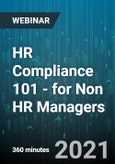Overview:
Knowing what to do in employee situations can be difficult for even seasoned Managers and Supervisors, especially if a Supervisor has never had training. For a new Supervisor these problems are intensified.
Employee problems easily morph into compliance and legal challenges and often with lighting speed while the Managers and Supervisor is still trying to get a handle on problematic situations. Many have never been trained in even the rudimentary basics of employment law and therefore do not even recognize problem situations until it’s too late.
Nevertheless, by the time an employee problem reaches HR, a level of liability has often been created. How an employer handles such problems, can either limit or increase liability. Further exacerbating the problem is that Supervisors often inherit a dysfunctional department and/or are promoted to supervise those with whom they once were coworkers.
If Managers and Supervisors don’t know how to avoid problems and the HR Dept. doesn’t know how to recognize or fix problems, what can be solved as say, a mere miscommunication, can quickly turn into a costly lawsuit.
With this in mind, the instructor will take attendees through best practices to prevent litigation and general dysfunction by ensuring compliance with HR laws and employee relations and management practices from a Manager and Supervisor perspective.
Why you should Attend:
Preventing discrimination, harassment, bullying and general dysfunction
Accommodating employees with impairments
FLSA - Wage and Hour pitfalls
FMLA and leaves of absence
Understanding OSHA and workers compensation
Using the 4 tools of a manager; coaching, performance reviews, performance improvement plans and discipline
Rules for creating and using defensible documentation
What to do if someone is struggling doing their job for whatever the reason - having a process
What to do with employee complaints
Using performance management tools to help remove the fear from managers in managing the performance of, or taking employment actions towards low performing or problem causing employees
Inheriting a dysfunctional department - avoiding the pitfalls
Agenda:
Basics of the Big Four of employment compliance- Title VII, FLSA, FMLA, ADA
Leaves of absence
Accommodations
Basics of wage and hour
Recognizing harassment and discrimination
The elements of documentation
Knowing what to do in employee situations can be difficult for even seasoned Managers and Supervisors, especially if a Supervisor has never had training. For a new Supervisor these problems are intensified.
Employee problems easily morph into compliance and legal challenges and often with lighting speed while the Managers and Supervisor is still trying to get a handle on problematic situations. Many have never been trained in even the rudimentary basics of employment law and therefore do not even recognize problem situations until it’s too late.
Nevertheless, by the time an employee problem reaches HR, a level of liability has often been created. How an employer handles such problems, can either limit or increase liability. Further exacerbating the problem is that Supervisors often inherit a dysfunctional department and/or are promoted to supervise those with whom they once were coworkers.
If Managers and Supervisors don’t know how to avoid problems and the HR Dept. doesn’t know how to recognize or fix problems, what can be solved as say, a mere miscommunication, can quickly turn into a costly lawsuit.
With this in mind, the instructor will take attendees through best practices to prevent litigation and general dysfunction by ensuring compliance with HR laws and employee relations and management practices from a Manager and Supervisor perspective.
Why you should Attend:
Preventing discrimination, harassment, bullying and general dysfunction
Accommodating employees with impairments
FLSA - Wage and Hour pitfalls
FMLA and leaves of absence
Understanding OSHA and workers compensation
Using the 4 tools of a manager; coaching, performance reviews, performance improvement plans and discipline
Rules for creating and using defensible documentation
What to do if someone is struggling doing their job for whatever the reason - having a process
What to do with employee complaints
Using performance management tools to help remove the fear from managers in managing the performance of, or taking employment actions towards low performing or problem causing employees
Inheriting a dysfunctional department - avoiding the pitfalls
Agenda:
Basics of the Big Four of employment compliance- Title VII, FLSA, FMLA, ADA
Leaves of absence
Accommodations
Basics of wage and hour
Recognizing harassment and discrimination
The elements of documentation
Agenda
- Basics of the Big Four of employment compliance- Title VII, FLSA, FMLA, ADA
- Leaves of absence
- Accommodations
- Basics of wage and hour
- Recognizing harassment and discrimination
- The elements of documentation
Speaker
Teri Morning, MBA, MS, SHRM-SCP specializes in solving company "people problems."Teri is the founder and President of Hindsight Human Resources. www.hindsightcloud.com
Teri also sources HR software solutions for incident tracking, employee relations, safety (Incident Tracker), compensation (Compease) and performance management (Performance Pro).
Twenty+ years human resource and training experience in a variety of fields, including retail, distribution, architectural, engineering, consulting, manufacturing (union), public sector and both profit and non-profit companies.
Teri has enjoyed consulting with employers on their problems and trained managers and employees for over 20 years, meeting and working with employees from all types of businesses.
In addition to a MBA, Teri has a Master's degree in Human Resource Development with a specialization in Conflict Management.
Certified by the State of Indiana in mediation skills, Teri is certified in Project Management and IT Management, qualified as a Myers-Briggs practitioner and holds the SHRM certification of a Senior Certified Professional.
Who Should Attend
- New HR staff
- Front line Managers
- Department or branch Managers
- Anyone newly promoted to a Management position
- Managers who were promoted from within their Companies
- Small business Owner








